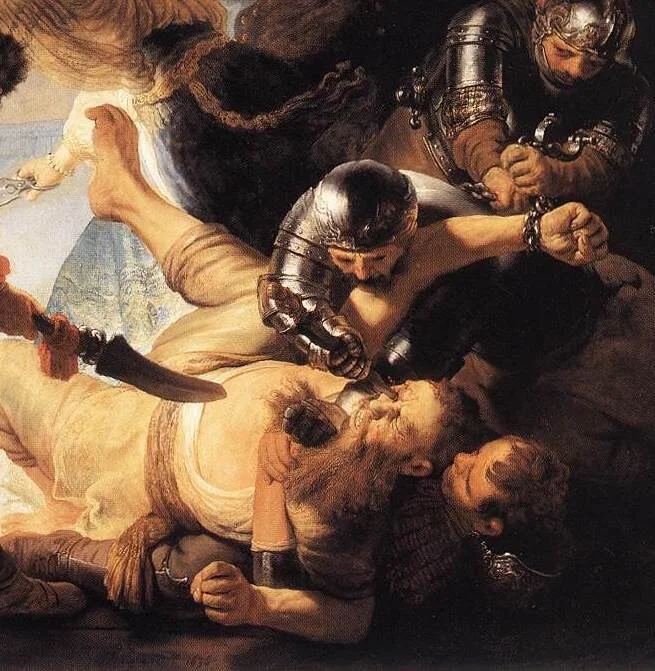Lent Series: Judges -- Gideon
In this second post of our Lenten series on the Book of Judges, Mthr Melanie writes on Gideon, and trust, and the glorious embarrasment of the Christian life.
Which of you, intending to build an out-house, does not first sit down and estimate the cost, to see whether he has enough to complete it?
Well, of course. Prudence is a very British virtue.
And which of you, if you were sent down to a riverbank to drink, wouldn’t kneel, and make a cup of your hands, and lift them to your mouth?
Well, of course. Decorum is a very British thing, too. Highly prized in a watchful and judgemental world.
But in the book of Judges, God tells Gideon to send away the soldiers who decorously scoop the water into their mouths. God has no use for these people. He is told to keep the soldiers who prostrate themselves at the riverbank and lap up the water with their faces, like a dog. For these people, God has a use.
Why? Because they are all in. They don’t care what people think. They have forgotten themselves completely in their commitment to what is before them. God wants those who (to use phrase from the psalmist) will drink deeply from God’s consoling breast. Great big gulps of his grace, not mimsy little sips of it.
But: those who drink deep of God will have their bottoms in the air. The world will see a row of bottoms. They will see such a person as abject, debased, idiotic. They will begin to ridicule him, saying, “This fellow began to build and was not able to finish.” Jesus knows we do not like to be ridiculed.
Jesus also knows that we like to make our own plans and stick to them. For what king, going out to wage war against another king, will not sit down first and consider whether he is able with ten thousand to oppose the one who comes against him with twenty thousand? If he cannot, then, while the other is still far away, he sends a delegation and asks for the terms of peace.
Well, of course he would. This is life and death. But God instructs Gideon ‘Whoever is fearful and trembling, let him return home’. And in that moment, thirty-two thousand men become ten thousand. Then, at the river-bank test, ten thousand become three hundred. Less than one per cent of Gideon’s troops remain. Surrender is the only rational option. How can he win?
Well, he can’t. But then, he doesn’t have to. It is not his strength, or the strength of his army that will win this battle. None of this is even Gideon’s idea. Gideon doesn’t have any ideas. He waits to hear God’s idea. And when he has heard it, he asks for a sign to confirm it. And when the sign comes, he asks for another sign. And when that sign comes, he asks for another sign. When he has listened, discerned, confirmed that this is God’s will - then, he acts.
And when he acts: all in. Total commitment. No matter that the enemy is ferocious and he is colossally outnumbered - Gideon is dauntless. He knows that this is the Lord’s work. And that he, the Lord, will do it.
So: is it the Lord’s work? God’s outhouse or our outhouse? If it’s God’s, we can trust to him that he will bring it to completion. If it’s ours, why are we building it? God’s battle or our battle? If it’s God’s battle, we’ve only to join in. Christ has already got the victory. If its our battle, why are we fighting it?
Gideon seems an unlikely hero in Homeric terms. An unheroic lack of initiative on the one hand, a rash, almost suicidal, daring on the other. But then Christ is the same unlikely hero: prayerful caution in discerning God’s will; and total self-effacing commitment in doing it.
Our way is the opposite. Our way is fervent commitment to our own plan (let’s surrender), and great timidity in carrying out God’s (costings first). And so we give things up for Lent. Like Gideon at prayer. We give up our own way. And, we take things up for Lent. Like Gideon in battle. We commit to God’s way.
Like most Church of England clergy I marry people who don’t believe in sacraments and I baptise babies who won’t be brought to church. They may or may not come to follow Christ on day. We pray that they will. They are many in number. They can be counted. But they cannot be counted on. People who scoop a dainty handful of the living water. People making careful plans for sensible accommodations. They will be a success at cocktail parties and in the actuarial profession. But they are no use to God.
Eleven years ago almost to the day I woke up on a Tuesday morning and realised I really did have to be a Christian. I emailed a friend (now a priest) who said this:
“If you are going to be a Christian, you will have to get to grips with Jesus. Not some abstract Greek Christ, but Jesus, the Jew, whose name we are sometimes embarrassed even to say.”
Jesus, whose name we are embarrassed to say, was not ashamed to be found in human form. Jesus, whose name we are embarrassed to say, prayed in perfect trust: God’s will be done. Jesus, whose name we are embarrassed to say, willingly faced death for our sakes: exposed, ridiculed, resourceless. This Jesus, whose name we are embarrassed to say, says ‘Let anyone who is thirsty come to me’. We have only to prostrate ourselves, and drink.




